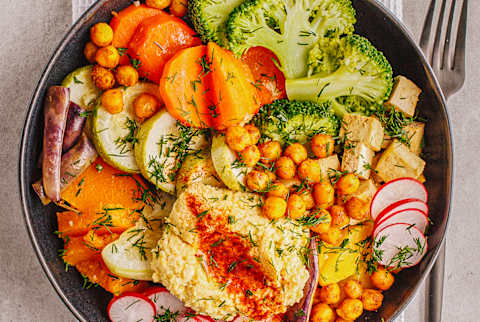
Neuroscientist
Neuroscientist
Dr. Nicole Avena is a research neuroscientist, author and expert in the fields of nutrition, diet and addiction. She received a Ph.D. in Neuroscience and Psychology from Princeton University, followed by a postdoctoral fellowship in molecular biology at The Rockefeller University in New York City.

Image by Morsa Images / iStock
July 24, 2024
There are specific foods that have been shown to help reduce sugar cravings. Keeping these foods on hand can be beneficial if you’re aiming to cut back on sugar.
The good news? None of these foods are fancy; they’re all readily available at your local supermarket.
Yes, berries are a fruit, but they crush your cravings not due to their sweetness but to other benefits they provide. Berries contain a ton of fiber and are considered low GI. This, in turn, creates a low-level insulin spike compared to other fruits that contain high sugar content.
Including berries in your meals and dishes can help curb a natural sweet tooth. Berries also have a high water content when compared to other fruits and can aid in hydration. Finally, berries contain polyphenols. Polyphenols have been linked to decreasing inflammation in the gut lining1, which can be harmed through sugar addiction and keep people addicted. By decreasing this inflammation, you can overcome a sugar craving and, further down the line, a sugar addiction.
Including berries in things like homemade sauces, unsweetened iced tea, or as a fun yogurt bowl topping can help you stay hydrated and kick your cravings.
Avocados, like berries, are a standout fruit because they have proved that the combination of fat and fiber can also be a hunger-crusher.
In a clinical trial2, avocados were substituted for carbohydrate-dense, low-fat breakfast ingredients. The trial found that the satiety hormones in the brain were more prevalent after consuming the avocado versus the high-carb meal. This can prevent sugar cravings by reducing the overall feelings of hunger. We don’t crave something sweet when we are fully nourished by monounsaturated fats and fiber—found in avocado!
Not an avocado fan? Try blending them into a pesto, smoothie, or dressing to get a creamy texture and all of the benefits.
Pistachios can therefore displace the need for sweets and promote an overall healthy dietary pattern. They’re packed with protein, which is an important factor when addressing sugar addiction. Protein is made up of amino acids, which can build the pathways in our brain that stop sugar addiction.
When the neurotransmitter levels and hormones in the brain are functioning properly, they will be deterred from wanting unhealthy food options like soda and candy. A recent study showed that regular pistachio consumption4 was associated with weight loss and other cardiometabolic health benefits, including lower blood pressure, and best of all, it was also shown to reduce intake of sweets!
So, grab a handful of pistachios next time you feel a sugar craving coming on, or build your own sugar-free trail mix using pistachios and other on-the-go foods such as cacao nibs.
Chia seeds are full of essential fatty acids that fuel our body and its pathways. They are also a complete plant protein, containing all nine essential amino acids. This is important because it means these seeds are of high biological value (HBV). HBV proteins are easier for our bodies to absorb and utilize, and therefore control sugar cravings.
Finally, chia seeds have a lipid profile5 that has been proven to prevent blood glucose spikes and improve blood lipid profiles. This can also benefit those with a sugar addiction because of the long-lasting effects chia seeds have on the entire body, not just one area or system. Chia seeds are a great way to sneak up on a craving.
Sprinkling them on top of toasted bread with a little cream cheese, in oatmeal, or all alone in chia pudding can taste great and stop cravings in their tracks.
Legumes in general are a staple in the diets of some of the healthiest populations worldwide, including the Mediterranean. Legumes are filled with fiber and plant-based protein.
The overall nutritional components of chickpeas make them a great choice for overcoming sugar addiction. They have little flavor and are very versatile while still packing a total of 18 to 22 g of fiber per 100 g of chickpeas.
Fiber is split into insoluble and soluble categories. Chickpeas contain both kinds of fiber, making them beneficial to the overall gut microbiome diversification. Having a diverse gut microbiome can improve cravings along the gut-brain connection and signal hunger and fullness to the brain at a more efficient rate.
Oats are a whole-grain powerhouse. They contain fast-digesting and slow-digesting carbohydrates that provide your body with a boost of energy and prevent fatigue. Fatigue is one of the leading causes of sugar cravings. When we are tired, our body craves fast-digesting energy (like sugar).
Oats contain a soluble dietary fiber called beta-glucan. Beta-glucan has been shown to reduce postprandial (after-feeding) glucose values as well as cholesterol. This can help our bodies break away from sugar addiction and maintain a healthy biochemical state. Oats can be added to many different meals to replace white flour!
Thicken up a sauce or stew using oat flour, by blending oats in your blender or food processor until fine.
The polyunsaturated fatty acids (PUFA) found in olives, when combined with carbohydrate intake, have been shown to regulate our glucose-insulin homeostasis. But how is this important when trying to break a sugar addiction?
Our bodies utilize glucose as our main energy source. While glucose is a good thing to have around, glucose that lingers in our bloodstream is problematic. Insulin comes in to help by signaling to the body that it’s time to absorb the glucose from our blood into our cells.
Homeostasis between these mechanisms is crucial when evaluating insulin resistance, which is a common condition among those who consume too much sugar in their diets. PUFAs are also beneficial for heart health and overall longevity6. Think tapenades, cheese boards, and salad additives to spice up your meals using olives.
Sweet potatoes have almost the same macronutrients as regular white potatoes, but they stand out because of their micronutrient content. Sweet potatoes contain an inactive form of vitamin A known as carotenoids. Carotenoids have the power to improve our cognitive function over time7.
They can also prevent diseases of lifestyle, including eye issues and cancer8, but the real sugar-rewiring power they hold comes from our brains.
Our brains utilize neurostimulation and hormones to affect our mood and daily function. Sugar stimulates dopamine or the happy neurochemical. Vitamin A can help combat this by reducing sugar cravings and regulating the release of dopamine.
Sweet potatoes are an easy side dish when baked, or a vehicle for protein. Keeping roasted sweet potatoes prepared for a week’s worth of meals can save you time and sugar cravings.
Unsweetened Greek yogurt is packed with protein and a great replacement for normally high-fat condiments and ingredients like sour cream. The protein in Greek yogurt is a complete protein and is known for keeping us satiated for long periods of time and therefore prevents sugar binges at night.
One meta-analysis looked at the effects of protein on appetite and found that meals containing complete proteins increase fullness ratings more than lower-protein meals9. This, in turn, influences BMI and metabolic syndrome. Incorporating more Greek yogurt into your cooking can allow for less sugar in the long run.
A go-to snack can be fresh veggie dip using Greek yogurt and seasonings.
Spirulina is a nutritional powerhouse alga that is dried into a bright green powder for consumption. It contains multiple vitamins and minerals, and there is also evidence to support its role in reducing appetite and blood lipid levels.
Spirulina was used in a placebo-controlled study to see its effect on appetite and lipid profiling. The findings showed significant reduced appetite when the participants consumed 1 g per day of spirulina in their diets. By reducing overall appetite, your body no longer craves the high blood glucose spike that is satisfied by sugary foods and the uncontrollable eating aspects sugar gives to food, and therefore you won’t feel the need to consume sugar.
You can add some spirulina to your smoothie for a boost of nutrition and a little help with lessening those sugar cravings. You can also disguise spirulina in spreads, such as mashed avocado, and condiments such as mayo and ketchup!







